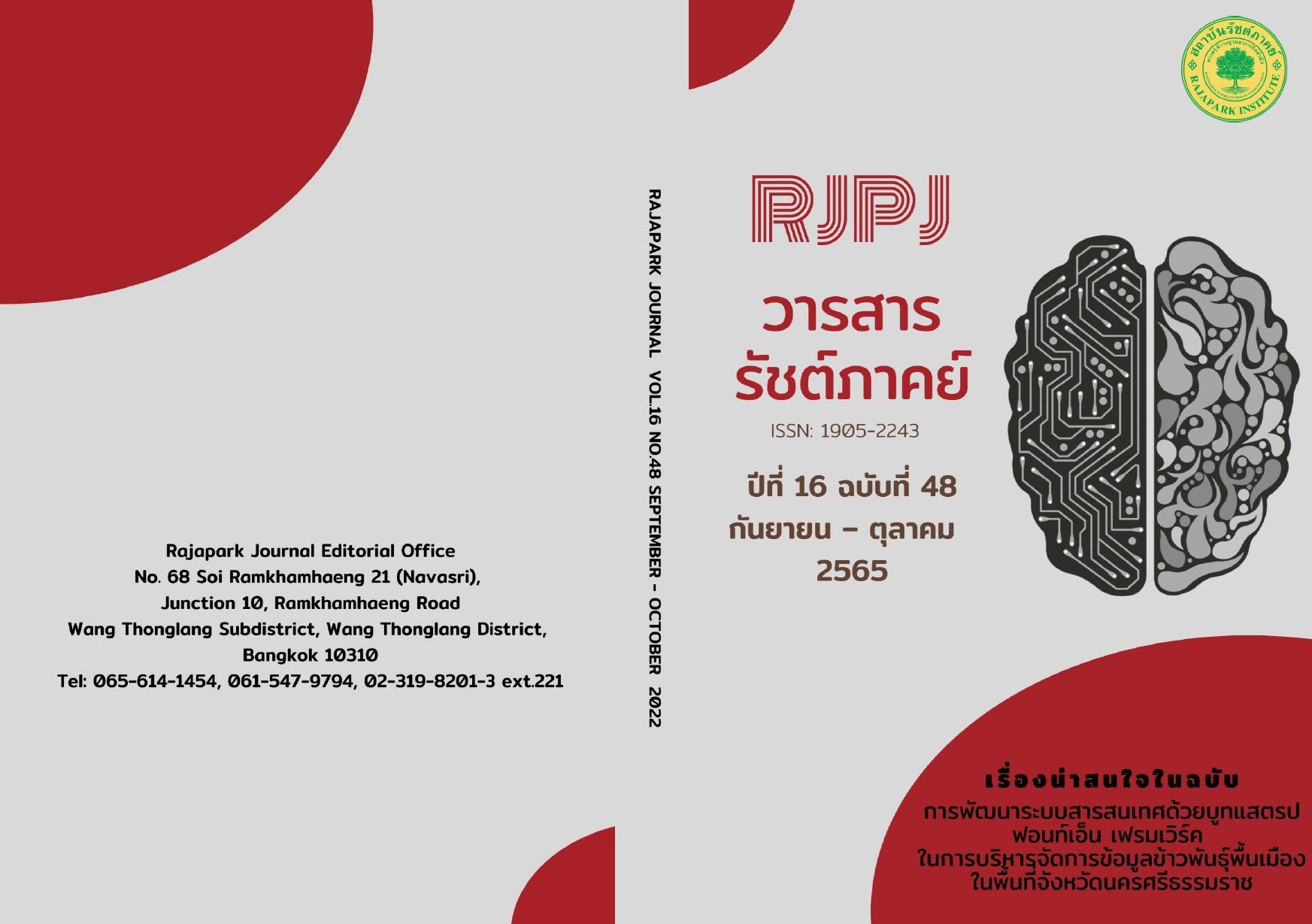Model of Digital Leadership for Administrators in Schools Under The Authority of The Office of The Basic Education Commission
Main Article Content
Abstract
The objectives of this study are as follows to synthesize the components of digital leadership administrators in school under the office of the basic education commission; and to analyze the exploratory composition of digital leadership administrators in schools under the Office of the Basic Education Commission. This study employed mixed methods research. The qualitative research was a focus group discussion with 14 key informants, selected by purposive sampling method. The instruments were open-ended questions to guide group discussions. In terms of quantitative research, the sample group for the quantitative approach consisted of 360 directors and teachers in schools by determining the sample size using the rule of thumb of 20 of the number of components. The sample size was 300 people, then increased by 20% and a multi-stage random sampling method of 180 people per area divided by their position in a school: one administrator and 17 teachers, with a total of 18 people per school, and simple random sampling was performed. The instrument was a questionnaire with a confidence value of 0.990. The statistics used for analyzing the data were content analysis, frequency, percentage, mean, standard deviation and exploratory factor analysis. The findings of this research were as follows: the elements of digital leadership administrators in schools under the Office of the Basic Education Commission of seven elements and the results of the exploratory component analysis of digital leadership among administrators in schools under the Office of the Basic Education Commission consisted of seven elements: digital vision, digital knowledge and skills, digital management, digital culture, digital networks, digital adaptation and digital strategy.
Article Details

This work is licensed under a Creative Commons Attribution-NonCommercial-NoDerivatives 4.0 International License.
Views and opinions appearing in the Journal it is the responsibility of the author of the article, and does not constitute the view and responsibility of the editorial team.
References
Broadribb, K. (2014). Digital Leaders: The New Technology Gurus in School. https://wholeeducation.wordpress.com/2014/11/18/gigital-leaders-the-new-technology-gurus-in-school
Chaemmchoy, S. (2019). School Management in Digital Era. Chulalongkorn University.
Damayanti, F.P., & Mirfani, A.M. (2021). An Analysis of Digital Leadership in the Pandemic Covid-19 Era. Advances in Social Science, Education and Humanities Research, 526, 156-159. file:///C:/Users/HP/Downloads/125952613.pdf
Digital Economy Promotion Agency. (2018). Plan for Digital economy Promotion 2018-2022. https://www.depa.or.th/storage/app/media/file/depa-Promotion-Plan-Book61-65.pdf
Gilster, P. (1997). Digital literacy. John Wiley.
Kaganer, E., Sieber, S., & Zamora, J. (2014). The 5 Keys to a Digital Mindset. Forbes. https://www.forbes.com/sites/iese/2014/03/11/the-5-keys-to-a-digital-mindset/
Keesukphan, E. (2016). School Management in Digital Era. https://www.trueplookpanya.com/knowledge/content/52232/-edu-t2s1-t2-t2s3-Gorton
Komolwanich, S., Sonsupee, S., Petwisit, B., & Chimtim, K. (2020). Digital Leadership of School Administrator Under the Secondary Educational Service Area Office 23. In The 21st NGRC, March 27, Khon Kaen University. https://app.gs.kku.ac.th/images/img/support/grc2020 /pdfabstracts//HMO16.pdf
Leesakul, P. (2018). Leadership in Digital Era. https://today.line.me/th/pc/article/Leadership+in+digital+era
Martin, A., & Grydziecki, J. (2006). DigEuLit: Concepts and Tools for Digital Literacy Development. ITALICS; Innovation in Teaching & Learning in Information & Computer Sciences, 5(4), 246-264. https://doi.org/10.11120/ital.2006.05040249
Miller, C. (2018). Digital Leadership: Using the Internet and Social Media to Improve the Lives, Well-Being and Circumstances of Others. Journal of Family and Consumer Sciences, Alexandria, 110(1), 45-48.
Ritter, J. (2015). Digital Leadership. https://searchcio.techtarget.com/definition/digital-leadership
Rodphon, S., Khuntaree, N., Phoklin, S. (2021). A Study of Digital Leadership among School Administrators of Pracharath school Project Under Sisaket Primary Educational Service Area Office 1. Journal of Education Administration and Leadership Sakon Nakhon Rajabhat
University, 9(35), 36-45.
Sangpho, J. et al. (2017). Leadership in organizational management in the digital age: A case study of IT organization and IT-related organizations in the Bangkok Metropolitan Region. College of Innovation, Thammasat University.
Sheninger, E. (2014). Pillars of Digital Leadership in Education. http://leadered.com/pillars-of-digital-leadership/
Sullivan, L. (2017). 8 Skills Every Digital Leader Needs. https://www.cmswire.com/digital-workplace/8-skills-every-digital-leader-needs/
Tingsabadh, K. (2014). “Challenges of New Frontier in Learning : Education 4.0.” In Academic Seminar on New Frontiers of Learning: Education System 4.0. November 1, 2014 at Dusit Thani Hotel. Learning Innovation Center Chulalongkorn University.
Toduk, Y. (2014). 2023 Lideri-Dijital Çağın Liderlik Sırları. Istanbul, Doğan Egmont Yayınları.
Turan, M. (2018). Dijital Liderlik. https://poyrazruzgari.com/2018/01/12/dijital-liderlik/
Yusof, M.R. Yaakob, M.F.M., & Ibrahim, M.Y. (2019). Digital Leadership Among School Leaders in Malaysia. International Journal of Innovative Technology and Exploring Engineering (IJITEE), 8(9), 1481-1485.
Zhu, P. (2014). Five Key Elements in Digital Leadership. https://futureofcio.blogspot.com/2014/10/digital-leadershipeffectiveness.html


